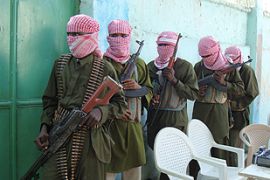Somali fighters seize port town
Marka, an entry point for food aid, falls to Shabab as a pro-government militia flees.

Marka is an entry point for the food aid urgently needed by more than a third of Somalia’s population.
World Food Programme (WFP) shipments, already hampered by rampant piracy in Somali waters, generally enter the country either by Marka or by Mogadishu.
Mohamed Sheikh Nur, a journalist in Mogadishu, told Al Jazeera: “The Somali government has repeatedly been saying that it will protect the entire area soon, but that is not something feasible right now.
“This is because government and foreign troops are bogged down in Mogadishu and have no power outside of these areas.”
Significant gains
Shabab fighters have made significant military gains in recent months, leaving the UN-backed transitional federal government in control of only some parts of Mogadishu and Baidoa, the seat of parliament.
 |
The fighters have broken away from the Islamic Courts, with the group’s political leadership fleeing into exile and the Shabab engaging in a guerrilla war that has left thousands of civilians dead.
On Tuesday, the Shabab seized Qoryoley, a town just over 100km southwest of Mogadishu.
African Union peacekeepers are stationed in Mogadishu, but violence goes on almost daily.
Humanitarian workers have frequently been targeted by armed groups in recent months, with several killed and others kidnapped.
Strict Sharia
In August, an alliance of Shabab fighters and forces loyal to Hassan Turki, a Muslim leader blacklisted as a “terrorist” by the US, seized control of Kismayo, one of the country’s largest cities and its main southern port.
They have since tried to enforce the Sharia (Islamic law) akin to that which prevailed when the Islamic Courts ruled much of the country.
When in power in 2006, the Islamic Courts carried out executions, shut down cinemas and photo shops, banned live music, flogged drug offenders and harassed civilians, mainly women, for failing to wear appropriate dress in public.